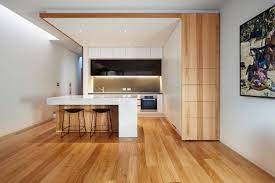The concept of a modern Japanese kitchen seamlessly blends traditional design principles with contemporary aesthetics, resulting in spaces that are not only functional but also visually striking. In this article, we delve into the elements that define a Japanese modern kitchen, exploring the unique features that contribute to its elegance and efficiency.
Minimalist Design Philosophy:
Central to Japanese modern kitchens is the minimalist design philosophy. Inspired by traditional Japanese aesthetics, these kitchens embrace simplicity, clean lines, and a clutter-free environment. The emphasis on minimalism creates a sense of calmness and serenity, allowing for a more focused and efficient culinary experience.
Natural Materials and Finishes:
Japanese modern kitchens often incorporate natural materials such as wood, stone, and bamboo. These materials not only contribute to the aesthetic appeal but also align with the Japanese reverence for nature. Wooden cabinets, bamboo flooring, and stone countertops create a warm and inviting atmosphere, connecting the kitchen to the natural world.
Functional Layouts:
The layout of a Japanese modern kitchen prioritizes functionality and efficiency. Spaces are organized to facilitate a smooth workflow, with designated areas for food preparation, cooking, and washing. The placement of appliances, storage solutions, and work surfaces is carefully considered to enhance the overall usability of the kitchen.
Multi-Purpose Islands:
Islands are a common feature in Japanese modern kitchens, serving as multi-functional hubs. These islands often incorporate a combination of a preparation area, a cooktop, and additional storage. The versatility of the island allows it to be a focal point for both cooking and socializing, promoting a sense of togetherness in the kitchen.
Integrating Technology:
While rooted in tradition, Japanese modern kitchens embrace technological advancements. High-quality appliances with sleek designs are seamlessly integrated into the kitchen space. Smart technology may incorporated for energy efficiency and convenience, enhancing the overall modernity of the culinary environment.
Paper Sliding Doors (Fusuma):
A touch of traditional Japanese architecture may be introduced through the use of paper sliding doors known as Fusuma. These doors add a layer of authenticity and elegance to the kitchen space. Their translucent nature allows for the play of light and shadows, creating a dynamic visual experience.
Neutral Color Palette:
Japanese modern kitchens often feature a neutral color palette, with whites, beige, and muted tones dominating the design. This color scheme contributes to the feeling of simplicity and serenity while allowing natural materials and textures to take center stage.
Task Lighting and Natural Light:
Lighting is a crucial aspect of Japanese modern kitchens. Task lighting is strategically placed to illuminate work areas, ensuring a well-lit and safe environment for cooking. Additionally, an emphasis on natural light is common, achieved through large windows or skylights that bring the outdoors into the kitchen.
Innovative Storage Solutions:
Storage solutions in Japanese modern kitchens are designed to maximize space while maintaining a streamlined appearance. Cabinets with hidden pulls, pull-out pantry shelves, and cleverly concealed storage contribute to the overall organization and uncluttered aesthetic.
Cultural Influences and Art:
Japanese modern kitchens often incorporate elements of Japanese art and culture. This may include traditional pottery, artwork, or even a small Zen garden near the kitchen window. These cultural touches add a layer of authenticity and personalization to the space. You might want to consider a shiitake log as an addition in your kitchen or some organic mushroom growing boxes.
Conclusion:
A Japanese modern kitchen represents the perfect synthesis of traditional Japanese aesthetics and contemporary design principles. The elegance of these spaces lies in their ability to balance functionality with beauty, and simplicity with innovation. As homeowners increasingly seek kitchens that are not just places for culinary activities but also extensions of their lifestyle, the Japanese modern kitchen stands out as a timeless and inspiring model that harmonizes the old and the new in a culinary haven.

